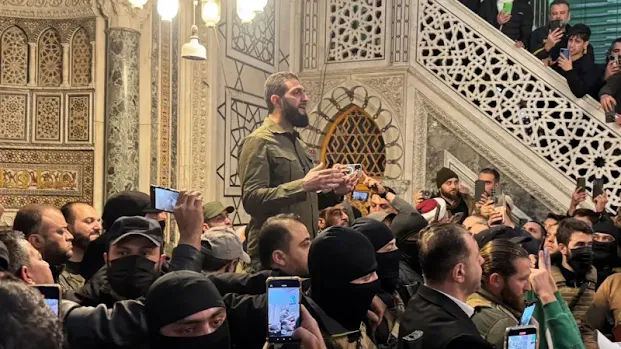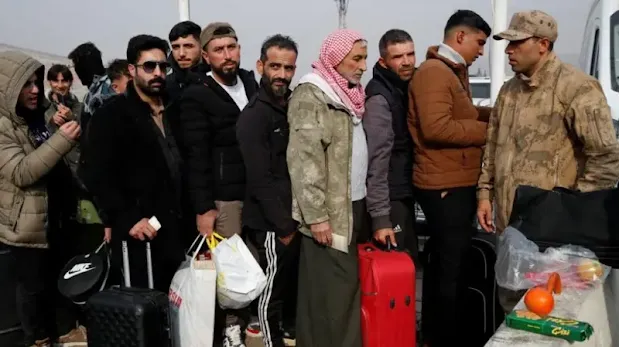Civil war, unified government or control by force: What will be the future of Syria after the rebel group takes over?
Rebel Control In Syria: A New Era Or Continued Strife?
Louis BrochuAhadah, BBC World ServiceDecember 15, 2024
Pros and Cons of Possible Futures:
1. Civil War
Pros:
- May create opportunities for other factions to rise and challenge any autocratic rule.
- International actors could intervene to broker peace and bring reforms.
Cons:
- Prolonged suffering for civilians, worsening humanitarian crises.
- Fragmentation of the country and loss of national unity.
- Economy and infrastructure further decimated.
2. Unified Government
Pros:
- Stability and focus on rebuilding the nation.
- Potential reconciliation among opposing factions, fostering national unity.
- Easier to attract international aid and investment.
Cons:
- Achieving unity may require significant compromises, leading to dissatisfaction among some groups.
- Risk of authoritarianism emerging under the guise of unity.
- Possible marginalization of minorities or dissenters.
3. Control by Force
Pros:
- Short-term stability and restoration of order.
- Prevention of further fragmentation of the state.
Cons:
- Suppression of dissent, leading to human rights violations.
- Increased resistance and insurgencies, resulting in a prolonged power struggle.
- Limited international recognition and support.
After the rebels led by Hayat Tahrir al-Sham overthrew the Assad family's brutal and decades-long rule, many important questions are now being raised about the future of Syria.
Hayat Tahrir al-Sham leader Abu Muhammad al-Julani has pledged to unite Syria in his statements, but it is uncertain whether he will be able to achieve this goal.
The UN special envoy for Syria, Geir Pedersen, has stressed the need to promote cooperation between all groups in Syria.
Given the rapidly changing situation, it is difficult to predict the future of Syria. However, in conversations with the BBC, experts have highlighted three possible scenarios for the country's future.
A united Syria
Abu Muhammad al-Julani has promised to unite Syria
The best thing for Syria would be for Hayat Tahrir al-Sham to work together with other political forces in the country and govern responsibly.
After the war, an atmosphere of national reconciliation can now be fostered in Syria. This is an opportunity to break the tradition of revenge and plunder that is seen in neighboring states. Failure to do so could lead to new conflicts.
In his opening remarks, al-Julani stressed the need for unity and mutual respect among Syria’s various sects. But it is also important to note that the agendas of the various groups in Syria are not identical.
“We don’t know where we stand yet,” says Christopher Phillip, a professor of Middle East affairs at Queen Mary University of London. “The writing team has taken a position that it is ready for a viable and peaceful transfer of power in Syria, but the situation is extremely unstable.”
The tribal militias that control southern Syria are unlikely to follow the new government in Damascus. They have never even recognized the rule of the Assad family.
Meanwhile, the threat from the so-called Islamic State in the east remains.
Parts of the country’s northeast are controlled by US-backed Kurdish groups. These US-backed groups have been fighting Turkish-backed rebel groups for years, and clashes have recently resumed in those areas.
Several opposition groups and political blocs have also formed outside Syria since 2011. However, “it is not yet clear whether these individuals and groups will return to the country and become part of a political transition process.”
Joseph Daher, a professor at the University of Lausanne in Switzerland and author of “Syria After the Uprising,” says there is uncertainty about whether a unified government can be formed.
He believes that the best option would be for free elections to form a unified government in Syria in which all groups are represented. “But what will actually happen remains to be seen.”
But Daher and other experts believe that such a scenario is highly unlikely. They point to a contradiction in Abu Muhammad al-Julani’s first public statement to prove their point.
‘First, Golani announced that the prime minister of the former government would oversee the transfer of power. Later, he nominated the prime minister of the National Salvation Government (Mohammed al-Bashir) established under Hayat Tahrir al-Sham in Idlib for this task.’
However, Joseph Daher believes that despite Hayat Tahrir al-Sham’s desire to gain full power, it will face difficulties in governing the entire country on its own.
According to him, Hayat Tahrir al-Sham was initially only in charge of Idlib, but now it also manages Aleppo, Hama, Homs and the capital Damascus. Daher believes that Hayat Tahrir will now have to share power with other groups.
Hayat Tahrir: Control by force
There are also concerns that Hayat Tahrir al-Sham, like the Bashar al-Assad regime, could use authoritarian methods to consolidate its rule.
Abu Muhammad al-Julani had previously established a power base in Idlib, which was considered the largest stronghold of the rebels. Idlib was home to about four million people, most of whom were displaced people who had taken refuge here from other parts of the country. The area was administered by the National Salvation Government.
Under his leadership, Hayat Tahrir al-Sham imposed an Islamic system in Aleppo province, established courts and even a police force.
During this time, al-Julani showed expertise in local administration and diplomacy in addition to military operations, and emerged as a major player in the Syrian conflict.
In the areas under his group’s control, there is a government that manages the economy, health, education and security.
With these moves, al-Jolani was trying to prove that he could govern effectively by prioritizing stability and public services.
However, his critics say that while in control of Idlib, his group suppressed rival militant factions and dissent.
Protests broke out in Idlib before the Hayat Tahrir-led offensive began on November 27. Hardline Islamists and Syrian activists accused the Hayat Tahrir of authoritarian behavior.
Joseph Daher says the Hayat Tahrir used force to consolidate its rule. “Although the Hayat Tahrir consolidated its power in Idlib by integrating and providing services to all the armed opposition groups, its rule has also included repression and the imprisonment of political opponents.”
Following these allegations, the Hayat Tahrir implemented reforms, including the dismantling of a controversial security force accused of human rights abuses and the establishment of a department to deal with civilian complaints, but critics say these reforms were merely intended to silence the people.
The Hayat Tahrir claims that consolidating power in Idlib is essential for progress in Syria and the eventual removal of the Assad regime. However, Professor Dahir says the group is currently facing an unprecedented situation.
“Having extended its rule to Damascus, it has neither the military nor the human resources to manage all these areas,” he says.
Civil war
In the worst case scenario, Syria could spiral into chaos, similar to the Arab Spring that swept through other countries.
Libya's Muammar Gaddafi and Iraq's Saddam Hussein were ousted from power during this period, but there was no alternative force to replace them. Foreign intervention also contributed to the disastrous situation.
Critics say the vacuum created by the departure of dictators has been replaced by a wave of looting, revenge, power struggles and civil war.
In this scenario, the competition for power between Syria's various armed groups could lead to widespread violence, destabilizing not only Syria but the entire region.
BBC Arabic's special correspondent Firas Kilani said in his report that Bashir's first address as interim prime minister in Syria has caused concern for many and indicates the possible direction of the new government.
“During the new prime minister’s speech, there were two flags behind him, one of which was the ‘flag of the revolution’ and the other resembling the Taliban flag, which shocked many people.”
“This shows that the new government could follow the Taliban model of establishing an Islamic state governed by Sharia law,” he said.
“This raises new challenges and new questions about the future of minority groups and civil society organizations in the country.”
The role of external forces
Experts believe that which of the three will shape Syria’s possible future depends on the role that international powers play in the matter.
For decades, the Assad family has relied on the support of Russia and Iran, while Turkey, Western and Gulf countries have supported various opposition groups.
In the past few days, Israel has not only targeted Syrian military installations but has also acknowledged that its forces have been operating inside Syria, beyond a buffer zone in the Golan Heights.
Israel says its military has carried out hundreds of airstrikes since the overthrow of Bashar al-Assad's government, which it says have destroyed most of Syria's weapons stockpiles.
Israeli Prime Minister Benjamin Netanyahu has warned Syrian rebels not to allow Iran to regain a foothold in the country.
Turkey and other Middle Eastern countries, on the other hand, have accused Israel of trying to take advantage of the situation in Syria.
Philip warns that the Israeli operations could destabilize Syria.
Both Dahir and Philip agree that international sanctions on Syria should be lifted for its economic development and that world powers should also provide humanitarian aid.
"Now that the Assad regime has fallen, the sanctions should be lifted," says Daher.
"I think the US and the EU need to not only maintain but also increase the level of economic recovery and humanitarian aid."
In exchange for lifting sanctions, world powers could demand things like a new constitution and democratic reforms, says Philip.
Related Topics
#Syria #Middle_East #Israel #United_States












No comments: